-
Posts
12474 -
Joined
-
Last visited
-
Days Won
557
Content Type
Profiles
Forums
Events
Everything posted by Fiery
-

What do I stress test when overclocking?
Fiery replied to LocoChico's topic in Benchmarking, system performance
You can use the AIDA64 System Stability Test subtests in any combination you wish Regards, Fiery -
If it's a DDR4 system, then the long initialization is unfortunately normal at this time. It is caused by the new SPD bank switching mechanism specific to DDR4 modules. The bank switching unfortunately takes a lot more time than we've anticipated, usually 5 to 10 seconds at least, but maybe in your case it's even longer. We'll implement a workaround to put that delay down to less than a second as soon as our DDR4 system arrives. I'll post a message into this topic once a fixed AIDA64 build is available for download.
-
A minute to load AIDA64 is definitely unusual. In what circumstances does it take a minute to load AIDA64? What kind of computer do you have and what Windows version are you running? At which stage (e.g. "Scanning SMART Devices") does AIDA64 send a lot of time?
-
Thank you for the feedback. We've double-checked it, and the register AIDA64 currently uses to read CPU temperature seems to be the right one. You can verify that by checking CPU temperature in AI Suite. If you decide to install AI Suite for the test, then please create a new ISA Sensor Dump before and after installing AI Suite. There's a slim chance AI Suite may reconfigure the sensor chip about temperature measurement. As for the Cache & Memory Benchmark, what exactly happens? Is it just slow to complete, or an error message pops up? Please note that on DDR4 systems certain parts of AIDA64 may slow down for cca. 5 to 10 seconds, and it may look as if those modules locked up. But it's just a slowdown, and as soon as that "penalty" elapses, everything gets back to normal. The slowdown is due to the SPD bank switching mechanism of DDR4 modules. The bank switching sadly takes a lot more time than we've anticipated, which causes the 5 to 10 seconds slowdown when reading SPD memory module information. We'll work on that as soon as our X99 test platform arrives.
-
AMD keeps updating the hardware DirectX version of their GCN-class GPUs, even for the old(er) ones. It's not easy to keep up with that Soon every GCN GPUs will officially support DirectX 12, not just 11.2. Anyway, we'll update GCN GPUs to indicate support for DirectX 11.2 now. Thanks, Fiery
-
1) On Aquaero 4 you have to select the USB-LCD screen. On Aquaero 5 & 6 you have to change one of the screens to USB-LCD. 2) Yes, we can read the information block from the Aquaero, but its layout is quite complex, so we need a bit more time to process it and "wire" it to the existing sensor module of AIDA64.
-
We've just rolled out a new AIDA64 beta that supports Adafruit, Dangerous Prototypes HD44780, LPT (Parallel Port Connected) HD44780, Odroid-Show, picoLCD 20x4, Pyramid, Roccat Valo, USB2LCD+, Wallbraun LUI LCDs: http://forums.aida64.com/topic/2498-new-lcd-device-support-usb2lcd/
-

You can not move OSD Panel when mouse buttons are switched
Fiery replied to holjulan's topic in Bug reports
The mentioned fix has been implemented in the latest AIDA64 Extreme beta release available at: http://www.aida64.com/downloads/aida64extremebuild3136dqmxb7y2znzip After upgrading to this new version, make sure to restart Windows to finalize the upgrade. Let me know how it works -
We've added support for parallel port connected HD44780 character LCD and VFD displays, using the classic 8-bit Winamp wiring scheme. We've also implemented support for parallel port connected KS0108 LCD displays. You can enable the LCD device from AIDA64 / main menu / File / Preferences / Hardware Monitoring / LCD. The only thing needed to enable this feature is the LCD to be connected to a parallel port. PCI and PCIe parallel port controllers cards are fully supported. SilverStone FP54 and similar parallel port connected drive bay devices using HD44780-compatible displays are also supported. You can find the new AIDA64 beta update at: http://www.aida64.com/downloads/latesta64xebeta Please let us know if you find any difficulties enabling or using this new feature. Also let us know if you've got another kind of LCD device that is currently unsupported by AIDA64. BTW, Adafruit, Dangerous Prototypes HD44780, Odroid-Show, picoLCD 20x4, Pyramid, Roccat Valo, USB2LCD+, Wallbraun LUI LCDs are also supported now by the latest AIDA64 beta. Note: upcoming AIDA64 beta releases will implement support for more parallel port connected LCDs. If you have such an LCD, please post a message into this topic stating what kind of LCD do you have and what sort of controller (driver) is it based on. Regards, Fiery
- 2 replies
-
- SilverStone
- LPT
- (and 7 more)
-
The mentioned fix for Asus X99 motherboards is available for download at: http://www.aida64.com/downloads/aida64extremebuild3136dqmxb7y2znzip
-
We've added support for character based LCD displays using the USB2LCD+ protocol, as described at: Coder for Life - Project - USB2LCD+ You can enable the LCD device from AIDA64 / main menu / File / Preferences / Hardware Monitoring / LCD. After enabling it, make sure to set the LCD size (on the same page of the AIDA64 Preferences), since USB2LCD+-capable devices will not provide such information to AIDA64. Currently the following LCD sizes are supported: 16x2 16x4 20x2 20x4 The only thing needed to enable this feature is having the appropriate USB2LCD+ drivers installed, and the LCD to be connected to a USB port. You can verify if your device is USB2LCD+ compliant by finding the device on the Devices / USB Devices page in AIDA64, and checking its Device ID. It should be 5BCD-5BCD. You can find the new AIDA64 beta update at: http://www.aida64.com/downloads/latesta64xebeta Please let us know if you find any difficulties enabling or using this new feature. Also let us know if you've got another kind of LCD device that is currently unsupported by AIDA64. BTW, Adafruit, Dangerous Prototypes HD44780, LPT (Parallel Port Connected) HD44780, Odroid-Show, picoLCD 20x4, Pyramid, Roccat Valo, Wallbraun LUI LCDs are also supported now by the latest AIDA64 beta. Regards, Fiery
-
There's a Core i5 result in our reference benchmark results list And we do not want to add too many systems there, since that's not the point of the reference results. Our reference systems are strictly controlled, to provide a stable, reliable, accurate and reproducable result with all our benchmark tests. We tend to build only one or two systems for each platform, so if you look at the list, you'll see that there's one Ivy Bridge there, two Haswells, one Ivy Bride-E, one Sandy Bridge-E, one Kaveri, one Richland, one Trinity, one Vishera, etc. If we would add more Core i5, then Core i3, Pentium or Celeron owners would feel left out If we would add all of those, then the list would be too long, and our efforts on keeping the reference systems strictly controlled would waste too much of our resources. Regards, Fiery
-
It simply does the same thing as the memory CRC checking, but with such block sizes that would fit in the L1, L2 and L3 caches of your CPU. So it heavily stresses all CPU caches. In your case, considering how many things you've tried to replace in your system, I'd say it could either be the CPU or the motherboard. Out of those two, I'd start with trying a new CPU. It could be an affordable Celeron as well, you could probably borrow one easier than a high-end Core i5/i7 part. Regards, Fiery
-

You can not move OSD Panel when mouse buttons are switched
Fiery replied to holjulan's topic in Bug reports
Thank you, the reported bug will be fixed in the next AIDA64 beta release due in a few days from now. I'll post the download link into this topic once the new beta is available. Thanks, Fiery -
Thank you for the info and the data. The sensor-related bugs will be fixed in the next AIDA64 beta release due in a few days from now. I'll post the download link into this topic once the new beta is available. As for the strap, please provide us a bit more time to work on that. Our X99 test platform hasn't arrived yet, and we'll need that to fix a couple of issues. Thanks, Fiery
-
Unfortunately WIndows doesn't allow precise positioning of TabControl tabs, so we cannot arrange them in a way that would form a similar layout to Razer dynamic keys But, in the next AIDA64 beta release we'll widen the TabControl so you wouldn't have to use horizontal scrolling to switch between tabs.
-
I'm afraid it's not possible to schedule the logging facility of AIDA64. So you cannot start it at a given time and stop it at a given time, automatically. You have to manually start and stop the logging. You can however take the CSV logging output, have a date/time stamp column in it, and process the file after the logging by getting rid of the unnecessary lines.
-
It seems the crash is due to a bug in the Strike7 SDK that AIDA64 uses to communicate with the LCD screen. We've implemented a workaround to fix it from our end: http://www.aida64.com/downloads/latesta64xebeta But it will have an unfortunate side-effect: AIDA64 can no longer switch between LCD pages instantly. The page switch will only take place at the next LCD update, so it is best if you use the lowest update frequency possible, which is 500 milliseconds (AIDA64 / main menu / File / Preferences / Hardware Monitoring / Update Frequency). Hopefully Mad Catz will fix their SDK soon.
-
That shouldn't be a problem. However, please note that you can upgrade the installed version by extracting the portable ZIP package files into the installation folder of AIDA64. Let it overwrite any existing files. Your settings (AIDA64.INI) and your entered license will be retained.
-
Such things might happen when the system time gets updated in the background, e.g. roll it back to a previous date than before. If you experience the issue multiple times, please let me know. Thanks, Fiery
-
Your Windows user doesn't seem to have the right privileges (administrator rights) to let AIDA64 load its kernel drivers and so access the sensor chip of your motherboard. Make sure to provide the necessary privileges to let AIDA64 use its low-level hardware features. Regards, Fiery
-

New LCD device support: Samsung SPF Digital Photo Frames
Fiery replied to Fiery's topic in Hardware monitoring
Thank you for the feedback, it looks awesome -

New LCD device support: Samsung SPF Digital Photo Frames
Fiery replied to Fiery's topic in Hardware monitoring
Under Windows 8 and Windows 8.1 it's best to use the libusb-based Windows driver we've created. You can download it from: http://download.aida64.com/resources/lcd/samsung_spf_lcd_driver.zip You have to first start AIDA64, and enable Samsung SPF LCD support from the Preferences. Then, once the LCD is switched to Mini Monitor Mode, install the driver via Device Manager. Then restart AIDA64 and it should work. -

New LCD device support: Samsung SPF Digital Photo Frames
Fiery replied to Fiery's topic in Hardware monitoring
Thank you for the feedback, it looks great -
Under heavy load AMD iGPUs consume quite a lot of power, so unless you unlock APM to let the TDP loose, loading the iGPU will heavily cut back the CPU Turbo clock headroom. Regular 95W and 100W APUs are less affected, since with them there's 35W more headroom for Turbo.

